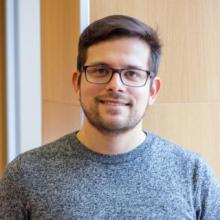
Guillermo Rangel-Pineros
Post-Doctoral studentGuillermo Rangel is a Chemical Engineer and Microbiologist from the Universidad de los Andes (Bogota, Colombia), with a Master´s degree in Biological Sciences. During my Master’s degree, he developed a great interest in bacteriophage biology and evolutionary ecology, this led him to pursue a PhD degree on this field. In 2014 he began my PhD at University of Leicester (Leicester, UK) under the supervision of Professor Martha Clokie, undertaking research exploring the diversity of Streptococcus pneumoniae bacteriophages and providing insights into their role in pneumococcal virulence. During his PhD he developed an appreciation for the numerous opportunities that bioinformatics and big data analysis offer to the study of bacteriophage-host interactions at the microbiome level.
Project summary
Viruses lack universally conserved marker genes and therefore require the application of alternative approaches for their taxonomic classification in metagenomic datasets. Previous work conducted by Dr. Alejandro Reyes’s research team at the Universidad de los Andes identified a subset of profile Hidden Markov Models (HMMs) that could serve as taxonomic markers for a wide range of currently known viral clades. My research secondment project, supervised by Dr. Rob Finn (EMBL-EBI) and Dr. Alejandro Reyes, is aimed at assessing the potential profile HMMs have for accurately classifying viral sequences from metagenomic datasets into their corresponding taxonomic clades. The output from this project is intended to contribute to the expansion of the analysis pipeline currently employed by MGnify, the open-source EBI’s metagenomic analysis tool developed by Dr. Rob Finn’s team.
Project outcomes and impact
Guillermo generated a pipeline that detects the presence of viral contigs in metagenomic assemblies and reports on their corresponding taxonomy. It was tested on a variety of publicly available metagenomic datasets. On a personal level, the secondment gave Guillermo both the scientific skills and the added confidence to persue his new postdoc position at Universidad de los Andes.
